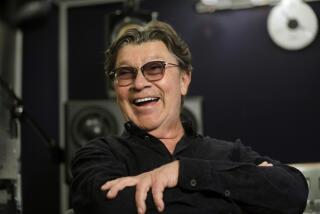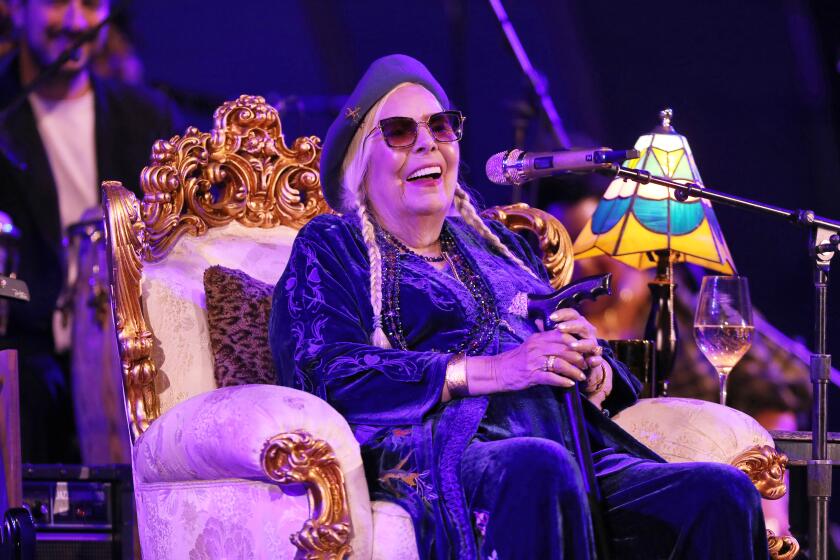CD Remembers Bassistâs Composing Skills
When Eric Von Essen died in Sweden at age 43 in the summer of 1997, he had a reputation in Los Angeles as a top-notch bassist and something of a multi-instrumentalist, having been heard on everything from cello to harmonica. Not as well known was his skill as a composer.
Von Essen was a Los Angeles phenomenon who recorded with pianist Jimmy Rowles, trumpeter Art Farmer, trombonist Bob Brookmeyer and numerous other big-name musicians. A composition student at UCLA in the â70s, he became a fixture at area clubs, and was heard frequently in the â80s at Lindaâs, the now-defunct Melrose Avenue room, with pianist Jeff Colella.
Throughout his career, Von Essen associated with such mavericks as guitarist Nels Cline and multi-instrumentalist Vinny Golia. His own music could be heard when the rarefied violin-guitar-bass-percussion ensemble Quartet Music that he and Cline put together in 1979 made an infrequent performance in a Santa Monica church or some other out-of-the-way venue.
Von Essen, who long faced substance abuse, relocated to Sweden in 1993, where he was professor of jazz studies at the Swerigefinska Folkhogskolan, a state-funded college in Haparanda. He apparently spent much of his time composing, leaving behind some 100 jazz compositions as well as orchestral and chamber music.
This month, the Venice-based Cryptogramophone label will release âThe Music of Eric Von Essen: Volume I,â a recording that features five different ensembles of Von Essen colleagues playing his compositions. Included is the trio of pianist Alan Pasqua, bassist Dave Carpenter and drummer Peter Erskine, a quintet fronted by trumpeter Stacy Rowles, a piano trio led by Alan Broadbent, and an electric guitar foursome with Cline and his brother, drummer Alex Cline. The surviving members of Quartet Music are heard on two numbers, with Michael Elizondo taking the bass chair.
Overall, the diverse program, with moods that range from the pastoral to high-tech, reflects Von Essenâs various interests. The constant is his impressively clean, often harmonically involved style.
Violinist and Quartet Music veteran Jeff Gauthier, who produced the disc, says the idea of recording Von Essenâs work occurred to him as soon as he learned of the bassistâs passing. But it took several years to pull together.
âA few months before he died, Eric was in Los Angeles and got some friends together to record some of his material,â Gauthier explains. âEric played only piano, and the recordings werenât the best quality, but they made it obvious that he was doing great work. When he died, it became apparent to us--Nels, Alex and myself--that this was music that needed to be out in the world.â
âEric was an intelligent musical companion,â says pianist Broadbent, who first heard Von Essen perform at Lindaâs and joined him for a stint in Brookmeyerâs rhythm section. âHe was studying orchestration and I turned him on to [Gustav] Mahler, who I thought was the greatest orchestrator of all time. I didnât hear from him for a while. Then I got a gift in the mail of his piano transcription of the fourth movement of Mahlerâs Seventh Symphony. I was amazed. I canât imagine how very difficult it must have been to reduce Mahlerâs orchestration into a piano transcription.â
âEric could write full orchestral music right out of his head,â says guitarist Cline, who was with Quartet Music when it joined with the Milwaukee Symphony Orchestra to perform Von Essenâs âPrayer for Jamesâ in the 1980s. âIâve been lucky to play with a lot of great musicians, but Eric was the single-most important influence of my musical life. And I miss him.â
Trumpeter-vocalist Stacy Rowles, who worked with Von Essen during his seven years as the musical director of the L.A.-based Jazz Tap Ensemble, remembers a night when Von Essen showed up at a local hotel where she and her father, pianist Jimmy Rowles, were performing, and sat in on Chromatic (slide) harmonica. âHe did terrific arrangements for the [Jazz Tap] Ensemble, but I didnât realize heâd written all these beautiful tunes until after he died.â
Cryptogramophone has two additional CDsâ worth of material from the same groups, recorded between February and August of last year, that it hopes to release, the first coming this fall. Information: https://www.cryptogramophone.com.
Fulton Memorial: A memorial service for Richard Fulton, proprietor of the neighborhood jazz hangout 5th St. Dickâs, will be held Saturday at 11 a.m. at an unnamed storefront at 4337 Degnan Blvd., near Gallery Plus in Leimert Park.
A celebration of Fultonâs contributions to the community will continue all weekend in Leimert Park with a variety of jazz groups appearing at the World Stage, Kaos Connection (next door to the newly refurbished 5th St. Dickâs at 3333 Degnan Blvd.) and other locations.
Groups scheduled to appear Friday at Kaos, beginning at 8 p.m., include saxophonist Dale Fielderâs quintet, guitarist Ron Muldrowâs quartet, pianist Nate Morganâs ensemble, the Watts Prophets and percussionist Leon Mobley. Vocalist Dwight Trible will be at the World Stage Friday and Saturday nights. Midnight jam sessions will be held at both locations each night. Information: (323) 296-2398.
Tribute: When Los Angeles-based pianist-composer-bandleader Horace Tapscott died in February 1999, he left a legacy of music and community activism that wonât soon disappear, according to those who were close to him. Two of Tapscottâs grandest projects, the Pan Afrikan Peopleâs Arkestra and the Great Voices of UGMAA (Union of Godâs Musicians and Artists Ascension) jazz choir will carry on that legacy April 9 at the Jazz Bakery, in the second annual Tribute to Horace Tapscott.
Saxophonist and longtime Tapscott associate Michael Session, who will direct the Arkestra at the event, says the pianist was more than musical instructor. âHe wore all the hats with me, not just teacher and mentor, but father, best friend and bearer of the wisdom tree. I came to him like a newborn baby and he put me under his wing and pointed the way.â
Vocalist and Voices of UGMAA director Dwight Trible, whose most recent recording was titled âHorace,â says Tapscott gave him the courage to pursue his own goals. âNo matter what the preconceptions of what a singer should do, no matter the criticisms, he showed me how to follow what was in my heart. The maverick spirit, thatâs what I got from Horace Tapscott.â
Session will also perform Tapscottâs music with his sextet at the free concert series at the Los Angeles County Museum of Art on April 7, and later that same night at Rocco in Bel-Air. Jazz Bakery information: (310) 271-9039.
More to Read
The biggest entertainment stories
Get our big stories about Hollywood, film, television, music, arts, culture and more right in your inbox as soon as they publish.
You may occasionally receive promotional content from the Los Angeles Times.










